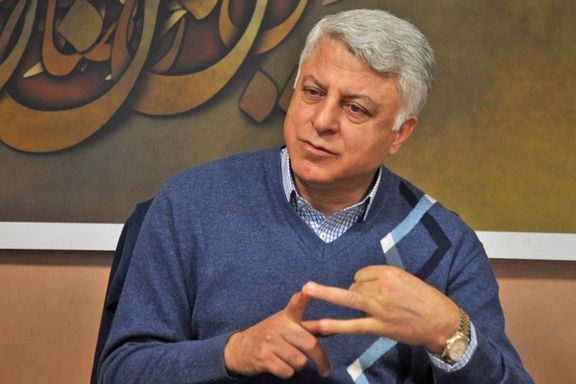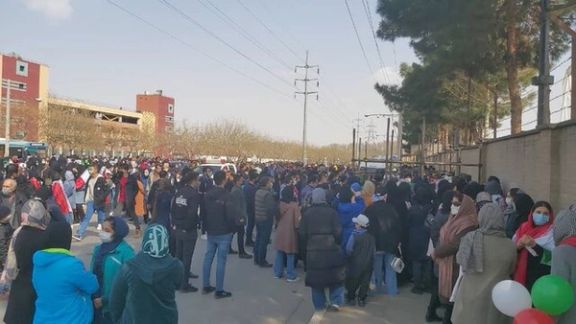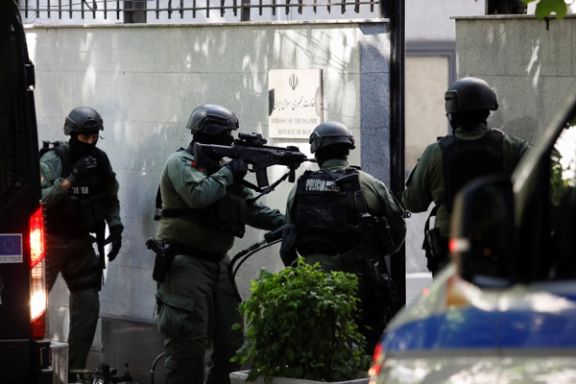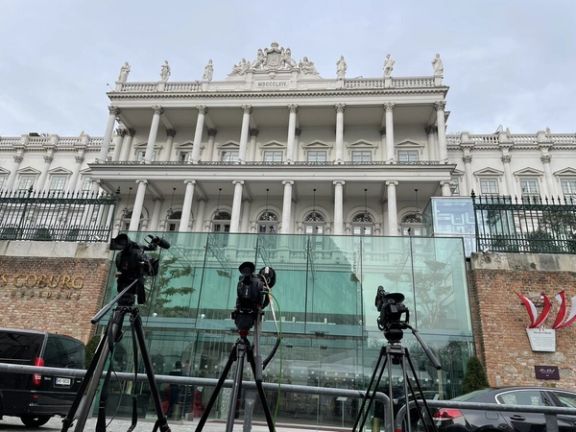Every Day 15 People Commit Suicide In Iran - Sociologist

The Iranian Sociological Association has announced a drastic rise in the rate of suicide in the country, saying an average of 15 people kill themselves in Iran every day.

The Iranian Sociological Association has announced a drastic rise in the rate of suicide in the country, saying an average of 15 people kill themselves in Iran every day.
In a conference on Thursday, held two days before the World Suicide Prevention Day, sociology professor Akbar Aliverdinia said that the rate of suicide has increased about 44 percent in the past 20 years.
He said, in 2001 the number was about four people in every 100,000 per year but currently the figure is over six, describing the rise as shocking. This brings the number annual total for suicides to over 5,000. In comparison, Turkey has an average of 2.5 suicides per 100,000 population.
Aliverdinia added that the data provided by the Iranian Legal Medicine Organization do not express the realities of the society properly because they only measure suicides that lead to death, while the number of attempted suicides is usually 20 times more.
According to the data released by Iran’s Health Ministry, in the Iranian year 1399 (which ended on March 19, 2021) 100,000 people attempted suicide in the country. The Iranian Legal Medicine Organization says 5,542 people died as a result of suicide in that year.
Most of the people who commit suicide in Iran are married men and from the western provinces of the country, where economic woes are prevalent. There is also a significant correlation between the misery index and number of suicides which are both increasing in the Islamic Republic.
Amid a dire economic situation, worsening in recent months, over a dozen people committed suicide in the last three months due to dismissal from their jobs and "livelihood problems".

Years after ex-president Mohammad Khatami was barred from media and public appearances, his camp has found a way to communicate his messages to the public.
Online media, including Rouydad24 website on September 7, quoted reformist academic Fayyaz Zahed as saying that Khatami told him in a recent meeting that "Reformism does not mean opposition to the Islamic Republic system." Fayyaz said that Khatami is still preoccupied with the idea of reforming the Islamic Republic.
Iran's reformists and their de-facto leader Mohammad Khatami, who has never announced himself as a leader, fell out of Supreme Leader Ali Khamenei's favor long before the end of Khatami's presidency [1997-2005]. However, Khatami was forced into isolation after the disputed re-election of conservative candidate Mahmoud Ahmadinejad in 2009 and the ensuing protests.
Since then, Khatami's presence was limited to rare appearances in rare electoral events and in YouTube videos where he called on voters to take part in elections. Even this worked against him when in the 2016 parliamentary and Assembly of Experts elections the list he advocated included several ultraconservatives with a reputation as thugs.
Meanwhile, the extremely poor and counter-productive performance of the reform faction in the parliament between 2016 and 2020, put the final nail in the reform movement's coffin as many reformist analysts have observed in numerous articles since 2020.
This, along with disqualification of reformist candidates by the Guardian Council, brought their share of the votes in the 2021 election to a humiliating 3 percent.

Fayyaz Zahed quoted Khatami as saying that "Iran's reformist are not in a position they deserve to be. They need to revise their ideas in many areas including their relations with the people. Khatami has also said that reformists need to re-organize."
According to Rouydad24, Zahed was in a meeting with Khatami on September 3 when they discussed current affairs and the reformists. Fayyaz said that "Khatami's main preoccupation is preserving the Islamic Republic." He said Khatami is loyal to the regime and feels indebted to the regime and the legacy of Ayatollah Ruhollah Khomeini the founder of the Islamic Republic of Iran in 1979.
This has been an important dividing issue in recent years among Iranian political activists at home and abroad. Those favoring regime change argue that Iran’s reformists wrongly think that the clerical-military system can be reformed, and Khatami is in fact the leader of this faction.
Khatami stressed on the rule of law within the Islamic Republic in his meeting. He said that Islam cannot support despotism, Zahed observed and added that Khatami still believed in his theory of dialogue among civilizations.
Oddly enough, Fayyaz said he is not allowed to share Khatami's ideas about reformists' political activity! He only explained that Khatami believed that reforms were the least costly way of correcting governance in Iran.
Other reports on Wednesday indicated that the regime under Khamenei was not even prepared to accept moderate conservatives such as Former President Hassan Rouhani. One report observed that the ultraconservative-dominated parliament still openly brands the Rouhani administration as the culprit for the current economic crisis in Iran. This is an accusation also made several times by President Ebrahim Raisi and his vice presidents and cabinet ministers.
The report observed that although some reformist figures such former vice president Es'haq Jahangiri have become more vocal recently, Iran's conservatives are quick to respond with more accusations, calling on former officials to keep their mouths shut.

FIFA has asked Iran to explain the incidents surrounding a match in March in the city of Mashhad where women who wanted to watch the game were pepper sprayed.
The Disciplinary Committee of the international governing body of association football – or soccer -- sent a letter to the Iranian Football Federation on Tuesday, and gave it a week to provide a response about the events at the FIFA World Cup qualifier between Iran and Lebanon on March 29, during which security forces denied women entry into the stadium and used tear gas and pepper spray to disperse them.
The letter stated five cases of violations of the body’s codes and regulations, adding that investigations are in progress about the incidents.
About 12,500 tickets were sold for the match, and 2,000 of them were allocated for women, but hundreds of women with tickets were not allowed into the Imam Reza stadium in the religious city of Mashhad.
Mashhad is home to numerous hardliner clerics who are against the presence of women in male dominated places. Firebrand representative of the Supreme Leader in the city, Ayatollah Ahmad Alamolhoda has been banning concerts and cultural events for years. The forceful banning of women’s entry into the stadium was reportedly ordered by the local clergy.
The world’s soccer authority had tried to convince Iran’s government -- which has barred female spectators from stadiums for years claiming it would violate religious rules of decency -- to lift the unwritten ban for nearly a decade. The ban has led to many arrests, beatings, detentions, and abuses against women.

An Iranian official says according to the available data about 95 percent of abortions in the country are carried out through "illegal" procedures.
Saleh Ghasemi, head of the Center for Strategic Research on Population, said on Thursday that abortion is one of the most effective variables in population growth, adding that "Only three percent of abortions [in Iran] are legal, and two percent of abortions are spontaneous."
He also said that only four percent of abortions happen due to what he called "illegitimate relations".
The ban on abortion in Iran has made women go to underground and often unsanitary centers to terminate their pregnancies. Unsanitary abortion has caused the death of many women and sometimes it has caused lifetime complications.
Earlier in the year, Iran’s Supreme Leader Ali Khamenei said efforts to increase the country's population are among the most urgent duties and essential policies of the Islamic Republic.
Parliament has passed legislation to outlaw tubectomy, vasectomy, and the free dispensation of contraceptives other than where pregnancy would threaten a woman's health. The health ministry has advised women over 35 to wait only a year before becoming pregnant again and under-35s to wait six months.
Medical experts have warned that the new legislation would increase sexually transmitted diseases by restricting access to condoms.
The law obliges the government to offer incentives, including a 7.5-fold increase in child-benefit payments to government employees, interest-free loans, and other benefits. While the new law does not include a ban on prenatal screening, doctors have been advised not to encourage it.

Iran’s foreign ministry Thursday rejected US and UK accusations about an Iran-linked cyberattack against Albania, which cut diplomatic relations on Wednesday.
Albanian counter-terrorism police searched the empty Iranian embassy in Tirana on Thursday, hours after Iranian diplomats burned papers inside the premises following the severing of diplomatic ties over a cyberattack.
“The US and the UK that had previously remained silent in numerous cyberattacks against the Islamic Republic of Iran’s infrastructures, and even against its nuclear facilities, and had directly or indirectly supported those measures, lack any legitimacy to level such accusations against the Islamic Republic of Iran,” spokesman Nasser Kanaani said in a statement.
Kanaani also warned against “any political adventurism against Iran with such ridiculous excuses” and expressed Iran’s “complete readiness to deal with any possible conspiracy decisively and immediately that would make them feel regretful.”
Albania severed its relations with Iran on Wednesday and ordered all Iranian diplomats and embassy staff to leave the country within 24 hours.
"The government has decided with immediate effect to end diplomatic relations with the Islamic Republic of Iran," Albanian Prime Minister Edi Rama said in a rare video address on Wednesday following an investigation into an alleged Iranian cyberattack in July which temporarily shut down numerous Albanian government digital services and websites.

"This extreme response...is fully proportionate to the gravity and risk of the cyberattack that threatened to paralyze public services, erase digital systems and hack into state records, steal government intranet electronic communication and stir chaos and insecurity in the country," he said.
The White House National Security Council hours later strongly condemned the cyberattack against its NATO ally Albania in a statement, saying it will “take further action to hold Iran accountable for actions that threaten the security of a US ally and set a troubling precedent for cyberspace.”
The new UK Foreign Minister James Cleverly also said in a statement Wednesday that “Iran’s reckless actions showed a blatant disregard for the Albanian people, severely restricting their ability to access essential public services,” adding that the UK joinsAlbania and other allies in “exposing Iran’s unacceptable actions.”
US Senator Jim Risch (R-Idaho), ranking member of the Senate Foreign Relations Committee also condemned Iran’s alleged cyberattack against Albania. “Iran must be held accountable for its malicious attacks, and I support Albania's decision to sever diplomatic ties. The US will continue to support Albania,” Risch tweeted Wednesday evening.
The alleged attack took place during a conference of the exiled Iranian Albania-based opposition group Mujahideen-e Khalq (MEK) in mid-July.
In an August 5 report, US cybersecurity firm Mandiant expressed “moderate confidence” the attackers were acting in support of Tehran’s efforts to disrupt the MEK conference, which had to be cancelled as well due to a terror threat.
The Mandiant report said several factors indicated that the attack had been carried out by pro-Iran hackers, including the timing, the content of a social media channel used to claim responsibility, and similarities in software code used with malware long used to target Farsi and Arabic speakers.
After Saddam’s fall in 2003, MEK members stationed in Iraq were moved to Camp Ashraf north of Baghdad, which had been established in 1986 during the Iran-Iraq war. In 2016, the MEK was transferred by the US to a new compound in Albania, where it is active on social media.
In July, Iran's Foreign Ministry sanctioned a group of US officials and lawmakers over their alleged support for the MEK group, that Tehran considers a terrorist organization.

As a US Democratic Senator told Iran International that not reaching a nuclear deal with Tehran can be cataclysmic for the US and the Mideast, Republicans disagreed.
US Senator Chris Murphy (D-CT) told our correspondent on Wednesday that “I think there is still a very good chance that we'll get a deal. We are closer than we ever have been before, and the consequences of not reaching a deal are cataclysmic for the US and the Middle East."
About the Israeli efforts to dissuade the US from an agreement with Iran, he said “I'm in constant touch with Israeli embassy. I saw the ambassador before the August break. I disagree with Israeli government's position, but I'm always ready to listen.”
Senator Tommy Tuberville (R-AL) said that “Unfortunately there's always a chance (for a deal with Iran) with the Biden administration. We're totally against it as Republicans, we feel for all the people in the Mideast.”
"I think the only thing they're trying to do is to figure out a way to get Iranian oil to Europe, and if that's the reason, we don't need to be doing it, because it'd put a lot of people in harm's way if Iran gets that nuclear weapon. I don't understand what they're trying to do. But let's wait and see. I hope they continue to have problems with talks to get any kind of deal with Iran," he added.
Ben Cardin (D-MD) told Iran International that “There's some conflicting provisions that have to be resolved before an agreement can take place.”
Iranian political analysts say Tehran's nuclear talks with the United States are likely to be prolonged even until after US elections in November.